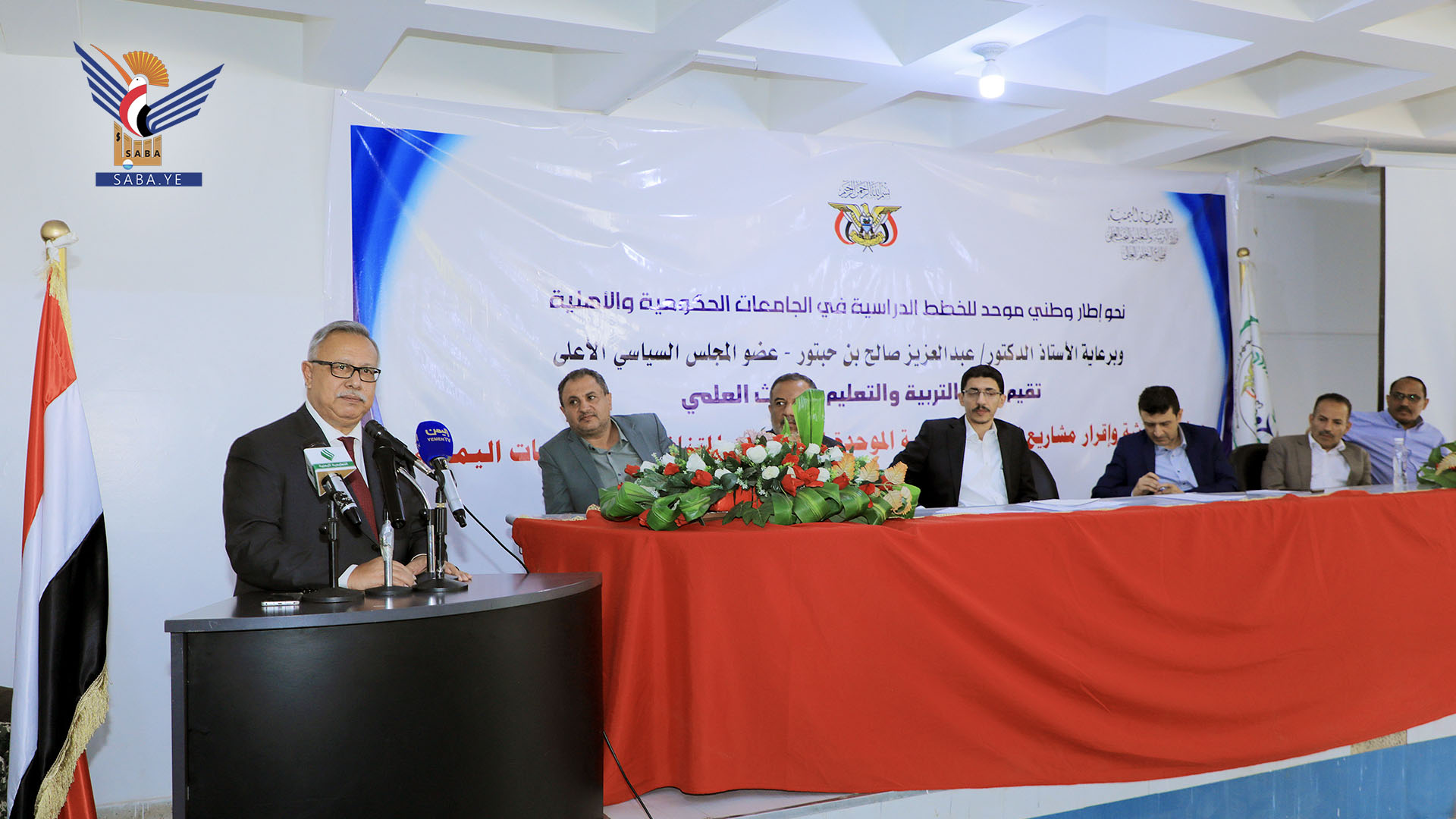Sana’a - SABA:
Member of the Supreme Political Council, Dr. Abdulaziz bin Habtoor, took part in a workshop organized by the Ministry of Higher Education and Scientific Research to discuss and approve unified academic curriculum projects for corresponding university programs in Yemen. The event was held under the theme: “Towards a Unified National Framework for Academic Curricula in Public and Private Universities.”
Dr. Bin Habtoor emphasized the workshop’s importance in addressing key challenges students face when transferring between universities, faculties, or academic programs. He stressed that while universities should strive for excellence—especially in final-year programs—this must align with practical needs and future demands. He also noted the necessity for university professors to stay current in their fields, particularly in scientific and academic content, rather than relying on outdated sources for years without updates.
He warned that stagnant or outdated curricula negatively affect academic outcomes and student competency. He urged lecturers to actively engage in knowledge production and incorporate the latest teaching methods and information, commending Yemeni universities for producing high-performing students internationally across Arab, Asian, and Western institutions.
Bin Habtoor also highlighted the strategic role of academics in addressing major issues, particularly the Palestinian cause, and denounced the atrocities committed against the people of Gaza by the Israeli regime, including the use of starvation as a weapon. He praised Iran’s long-standing support for Palestine despite its own challenges, citing its unprecedented missile strikes on Israel as a model of resistance.
He concluded by urging academics to take moral, ethical, and educational responsibility for raising awareness and distinguishing right from wrong, particularly amid events like the ongoing “Flood of Al-Aqsa” campaign. He expressed appreciation to the Ministry of Higher Education and all workshop participants, hoping the discussions would yield productive outcomes.
For his part, Minister of Higher Education and Scientific Research, Hassan Al-Sa’adi, explained that the workshop aims to unify academic curricula across Yemeni universities to resolve ongoing inconsistencies. He affirmed the Ministry’s commitment to addressing systemic issues across all levels of education—starting from early childhood through to higher education—despite the nation’s current challenges.
Al-Sa’adi noted that while curriculum standardization may be partial or full depending on each university’s uniqueness, the reform efforts are built on careful assessment of existing gaps and challenges. The initiative also reflects national development goals and sector needs.
He emphasized that concerns about loss of institutional identity would be addressed, and that a new education planning and curriculum division within the Ministry will collaborate closely with universities, schools, and experts to align academic offerings with national priorities and labor market demands.
During the session, Deputy Ministers Dr. Hatem Al-Da’is (Higher Education) and Dr. Omar Al-Bakheiti (Media) attended, along with Dr. Ibrahim Luqman, Head of the Higher Education Sector, who reviewed the work of the main and subcommittees. Their work spanned three phases: assessing the current academic environment, drafting proposed unified curricula, and enriching them through discussion and final approval.
Dr. Luqman stated that inconsistencies in academic programs across universities had created disorganization in the education process, especially for students transferring institutions. He added that the committee followed a methodology based on national academic reference standards (NARS), allowing 20% flexibility for university-specific innovation while standardizing course titles, credit hours, and ensuring balance between theoretical and practical content.
Dr. Mohammed Dhefallah, Secretary General of the Accreditation Council, added that significant curriculum discrepancies across institutions had prompted the Council to develop national reference standards for over 42 academic programs. These standards aim to unify academic offerings based on learning outcomes and teaching strategies. He highlighted the role of national standardized exams in measuring academic outputs.
Dr. Mohammed Al-Qatabri, Dean of the National Institute for Administrative Sciences, also emphasized the strategic value of the Ministry’s curriculum reform efforts, noting that successful educational development hinges on investing in human capital—the foundation for societal progress.
Attendees included officials from the Ministry of Higher Education, university presidents (public and private), and academic staff. The two-day workshop brings together over 278 academic professionals to finalize unified academic plans across disciplines, including humanities, law, medicine, management, and languages.

| more of (Local) |




